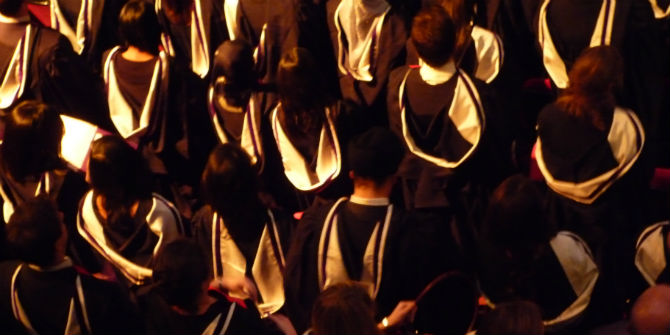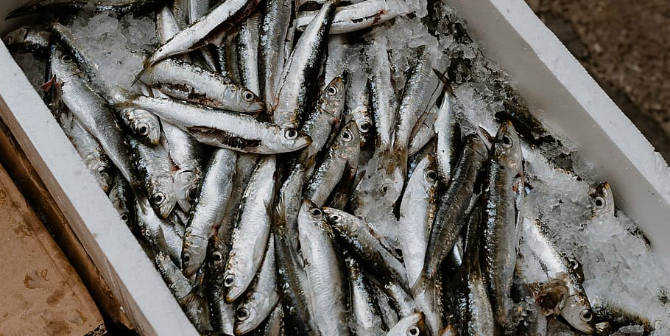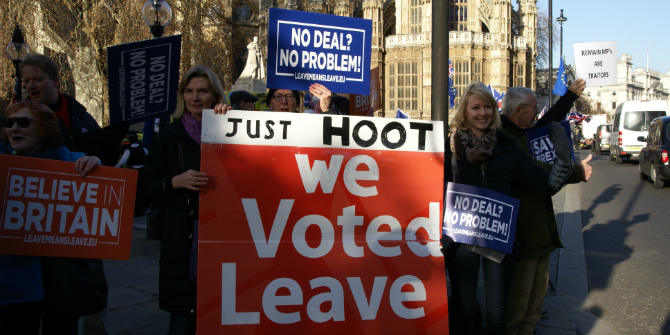 Higher education – although clearly not a government priority – is becoming a bargaining chip as the UK considers its future outside the EU. Anne Corbett (LSE) examines the May government’s proposal to treat higher education as a sweetener for free trade deals, an idea that is likely to have life in it whatever the immediate Brexit outcome.
Higher education – although clearly not a government priority – is becoming a bargaining chip as the UK considers its future outside the EU. Anne Corbett (LSE) examines the May government’s proposal to treat higher education as a sweetener for free trade deals, an idea that is likely to have life in it whatever the immediate Brexit outcome.
Spare a thought for second order policy sectors like higher education and research in this unpredictable Brexit saga. It is clear that this sector will not be a make-or-break issue for either the UK government or the EU. But the ideas being put forward and worked up in the backrooms of Brussels and Whitehall are likely to have some life in them, whatever the Brexit outcome. My work on decades of European policy making on higher education suggests that policy ideas seldom die. They hibernate.
Hardly surprising, then, that the White Paper published after the much-criticised Chequers meeting tries to balance the issues fundamental to a close relationship with the EU with those that would come to the fore under a ‘Canada+’ or ‘no deal’ scenario. These two ideas are cross-cutting collaboration with the EU, and/or higher education as world trade.

Cross-cutting collaboration
Cross-cutting collaboration with the EU is one of the novelties of the White Paper. Some might see this approach as cake-ism, and a belated government recognition of the collateral damage to the nation of not continuing to collaborate in other crucial policy spheres. But it is not just British cake at stake. Soon after Article 50 was triggered, the EU’s negotiator, Michel Barnier, set out the technical (albeit sub-optimal) possibilities for keeping the UK sector associated with EU programmes, adding that he knew how important ‘the EU is for creating networks and exchanges between universities in all 28 countries’. The post-2021 programmes, Horizon Europe and Erasmus+, at present working their way through EU decision processes, are in the frame here.
While technically these education and research programmes are independent of any UK-EU agreement, politically they are a live issue. The UK’s participation in research programmes has been hugely valuable in helping make the EU a global research hub: when member states’ output is combined, the EU outstrips the US and China. The Commission proposal to make the future Horizon participation criteria more flexible is doubtless influenced by the desire to keep the British in after Brexit.
The UK’s dream deal under this rubric would be for a science and innovation accord with the EU which would allow for continued participation in Horizon Europe, the Euratom Research and Training Programme, the Joint European Torus (JET) project and ITER as part of the UK science and innovation policy, as well as a continued access to ‘EU networks, infrastructure, policies and agencies’. In principle, the UK is ready to pay for what is no longer a right.
But a governmental view that values the sciences much more highly than the humanities and general education – and is always on the lookout to strengthen links with the Anglo-Saxon world – is also in play. The Erasmus+ programme, which has provided an effective hub for mobility and cross-cultural experience for millions of students, young people and their teachers, and which also supports the development of a European Higher Education Area through the Bologna Process, does not attract a similar level of government support. Here, although ‘the UK and the EU … continue to give young people and students the chance to benefit from each other’s world leading universities’ it is merely ‘open to exploring continued participation’ after 2020, preferring a UK-EU scheme such as those it operates with Australia and Canada.
A free trade strategy
The most game-changing element for the sector is the government’s explicit promotion of higher education as an adjunct to national trade policy. This would bring to the fore the question of conformity with the rules of the WTO’s General Agreement in Trade in Services. GATS four-fold definitions of trade in services consists of four elements
(i) cross-border trade
(ii) consumption abroad
(iii) commercial presence
(iv) the presence of natural persons providing services in investments.
So the activities that institutions, staff and students have taken for granted as part of an institutional or personal decision are monetised. Streaming a lecture from abroad becomes cross-border trade. Moving for education becomes consumption abroad. Investment in an overseas campus is commercial presence. Moving staff abroad is quantifiable as the presence of natural persons providing services.
But the most contentious issue is the strategy the government would like to adopt to attract the brightest and best students and academic researchers. It would offer reciprocal mobility to ‘close trading partners’.
Such an approach transforms UK universities and research into potential sweeteners in deals with countries with which they would not necessarily have associated. Think the close trading partnerships generated by the defence trade, think Saudi Arabia. A 2017 report for Universities UK from the UK Trade Policy Observatory (UKTPO) is explicit that FTAs could lead to trade deals where ‘the domestic regime of the country concerned is unconducive to the desired activity’.
On the continent, hostility to higher education as a trade in services is well entrenched. It is assumed that ‘trade’ leads to a decline in the quality of education and contradicts the notion of higher education as a public good. The European University Association, which represents over 800 universities and rectors’ conferences in 48 European countries, issued a policy statement in 2015:
‘Higher education benefits individuals, society, and the world at large, in ways that are not easily quantifiable. It is a public responsibility to which all citizens have right of access and not a commodity to be transacted by commercial interests on a for-profit basis. It should not be subject to international trade regimes’.
The picture may not be so black and white. An EUA adviser, Howard Davies, reporting on the EU-Korea Free Trade Agreement, illustrates the different choices made in regard to public education and FTAs. National and regional authorities may opt out of WTO commitments for public education. The recent EU-Canada (CETA), negotiated by the EU on behalf of member states. has done so. The 2015 FTA between the EU and Korea has not.
Also, FTAs may be less prescriptive than they sound. The UKTPO report showed that in 2017 only 20 per cent of FTAs contained provisions on education, of which only 7 per cent are legally enforceable. For research and technology collaboration the figures are 21 per cent and 9 per cent respectively. Nevertheless, government deals will potentially weigh heavily on policy.
Will higher education be drawn into the framework of global trade rules or allowed to remain outside? It is significant that the WTO currently has a working party looking at a revision of GATS on procedures for the recognition of professional qualifications. Or will we see attacks on rule-based regimes from the US?
| Free Trade Agreement under GATS rules | EU law | UK wishes |
|---|---|---|
| An agreement between two sovereign parties within the WTO and the General Agreement for Trade in Services | Action consistent with the Treaty of European Union statement of democratic values and the EU’s ‘four freedoms’ | The White Paper on the Future Relationship between the United Kingdom and the European Union ('Chequers plan') |
| Discrimination between citizens based on whether they are providing (i) cross border trade (ii) consumption abroad (iii) commercial presence (iv) the presence of natural persons providing services in investments | No discrimination between EU citizens | Potential discrimination: e.g., fees, visa requirements Potential for reciprocal mobility deals within FTAs |
| Issues of recognition of professional qualifications under study at WTO | EC Directives on the free movement of professionals as part of the Single Market in Services. Directive on the Mutual Recognition of Professional Qualifications | White Paper determined to do better than CETA. Wanting a system for mutual recognition enabling professionals to provide services across the UK and EU – and to include those operating either on a permanent or temporary basis across borders. Should cover the same range of professions as the EU Mutual Recognition of Qualifications Directive |
| Third country (restricted) access to programmes | Full role in EU programmes | Hope for fee-paying participation |
| Related to FTA in question | Financed out of EU’s budget building on its seven-year Multi-Annual Financial Framework | Part of annual UK budget settlement |
The self-styled ‘voice of the sector’, Universities UK, appears cautious but not fazed by the prospect of FTAs and the GATs rules that might go with them. Its chief executive, Alistair Jarvis, was quoted at the time of the UKTPO report as referring to the opportunities and challenges for UK higher education through future free trade agreements and the need for government support to facilitate international research collaboration.
The UUK would like the government to include higher education in any future UK FTAs on its terms, in favour of collaboration in science, research and innovation; the provision of education as a service through jointly-delivered degree programmes, double degree programmes, campuses, joint schools, distance education, or other forms of transnational education etc; recognition of degree qualifications; mobility of academic staff and students; and the right to use university title in overseas locations.
The fact is that the UK university sector has long been involved in international trade, and since the referendum the UUK has encouraged universities to work even harder for internationalisation-as-trade. Already 78 per cent of universities are involved in some form of transnational education. The UUK boasts that £95bn is generated for the UK economy of which more than £13.1bn is generated by export receipts, and 940,000 jobs are supported (To give an idea of scale, its income and expenditure are around £34bn). Other statistics give an even rosier figure.
A few universities may be able to strike out on their own regardless, helped by the academic autonomy they enjoy under their Royal Charter, their power and their prestige. Glasgow, Warwick, Imperial College, Oxford and Kings College London have all been cited as trying to graft themselves in some way into European structures with joint laboratories and research centres, or even as part of a European University Alliance, an idea promoted by Emmanuel Macron.
A minor place in a two-level game
But in the end, UK-EU negotiations are part of what the political scientist Robert Putnam defined three decades ago as a two-level game. Countries or institutions concerned in international negotiations simultaneously face outwards to their would-be partners and inwards to their domestic constituents. Their negotiating stance is partly dictated by what a government can sell at home. It is bad luck, for the UK higher education sector and the science community, that their political importance now ranks lower than that of nine DUP MPs.
This post represents the views of the author and not those of the Brexit blog, nor the LSE.
Dr Anne Corbett is a Senior Associate at LSE Enterprise with long-standing research experience in the field of higher education and Europe.






